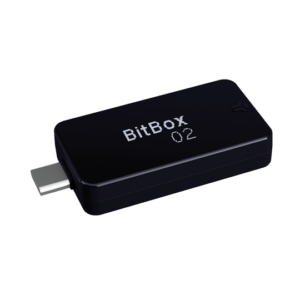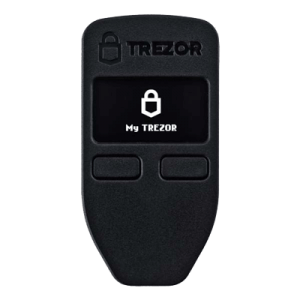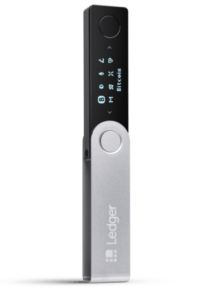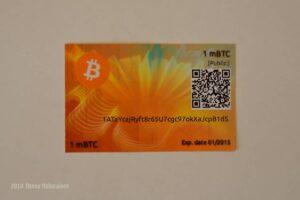If you want to safely store your cryptocurrencies, you need a crypto wallet. This is where the wheat is separated from the chaff. Only those who manage Bitcoin and Co. correctly benefit from the advantages of digital assets. In the crypto wallet comparison, CoinPro presents the best providers and wallet types.
What is a Crypto Wallet and What is it for?
A crypto wallet is, in a figurative sense, a digital wallet through which the respective user exercises access to their own cryptocurrencies. Transactions are received here and money transfers are initiated.
Cryptocurrencies themselves are never actually in a wallet, but always on the blockchain. In reality, the wallet is used to store private keys that claim certain coins. For the sake of simplicity, it is still said that you keep your coins in a wallet.
Top 3 Hardware Wallets 2023
| Hardware Wallet | Price | Supported Cryptocurrencies | Software | Review |
|---|---|---|---|---|
🛡️ BitBox02  |
135 CHF | over 1,500 | open source | BitBox02 experiences |
🔒 Trezor Model One |
109 CHF | over 5,000 | open source | Trezor Model One experiences |
✔️ Ledger Nano X  |
174 CHF | over 5,000 | proprietary | Ledger Nano X experiences |
The French company Ledger has been producing hardware wallets for crypto users since 2014. The long history and simplicity of the products make the brand the most well-known name in the field of crypto wallets.
With the Ledger Nano X, the Paris-based company delivers an extensive wallet that presents the current state of the art. It supports over 5,000 cryptocurrencies and tokens. If you want to do without some technology and take advantage of a cheaper offer, you can alternatively purchase the Ledger Nano S.
However, Ledger uses closed source software and therefore does not enjoy the trust of some users. Some people prefer the Czech brand Trezor, which produces the Trezor Model One, among other things. After its initial publication in 2014, this model was able to conquer the market by storm. Over 5,000 coins and tokens are also supported here.
Under the BitBox brand, the Swiss company Shift Crypto has been producing hardware wallets in Switzerland since 2018, which, like Trezor, rely on open source software. The latest version of this product line is the BitBox02. In CoinPro’s test, the product stood out as being particularly user-friendly.
Wallet Types at a Glance
What types of wallets are there? This knowledge is essential for users of cryptocurrencies. Only with the right wallet do crypto users benefit from advantages over classic bank accounts.
The most important difference is between custodial wallets and non-custodial wallets. Only with a non-custodial wallet does the user really retain control over their cryptocurrencies. Custodial wallets mainly occur with service providers such as crypto exchanges.
In this case, the deposited cryptocurrencies are in third-party custody and are under the care of the provider. Users should avoid investing their cryptocurrencies there in the long term.
Important: Not every program that looks like a non-custodial wallet actually works that way. A well-known example of this is the Chivo Wallet, which was distributed by the government of El Salvador among the Salvadoran people.
If you want to check whether the wallet of your choice is actually non-custodial, look for an option within the program such as “Show Private Keys” or “show secrets.” A non-custodial wallet will then show you your private key or a key phrase.
What are Hot Wallets and Cold Wallets?
A distinction is made between hot wallets and cold wallets. Hot wallets are in constant connection with the Internet, while cold wallets remain disconnected from the Internet. This significantly reduces the chance of revealing sensitive data.
Custodial wallets, as they are known from crypto exchanges, are always hot wallets. A cold wallet can be used entirely without the Internet, but then only has partial functions.
Are Hot Wallets or Cold Wallets Better?
Since cold wallets are not in constant connection with the Internet, they are considered less risky. At the same time, their use is more complex and less convenient. They are therefore not suitable for everyday use.
For this reason, experienced users like to use several separate wallets. For long-term savings, they create a cold storage, for everyday expenses they use a hot wallet – often in the form of software wallets.
Software Wallet – What is that?
A software wallet is a program that can be installed on an operating system. From there, the application can be started and used very easily. Users can send payments within a few seconds and receive funds.
The range of software wallets is huge. Usually, every cryptocurrency comes with at least one software wallet. Hardware wallets, on the other hand, only support well-known projects.
Popular software wallets are Exodus, Edge, Trust Wallet or Atomic Wallet. All of these programs support a whole range of cryptocurrencies. This is why they are also called Multi Asset Wallets. Many other software wallets only support a single cryptocurrency. A well-known Bitcoin wallet is called Electrum.

What is the Use of a Web Wallet?
A subcategory of software wallets are web wallets. Their best-known representative is MetaMask. Programs of this type are added to a web browser as an extension and can then communicate directly with the website visited.
Due to this functionality, web wallets are an essential part of Web3. Users can authenticate themselves on websites to gain easier access and call up DeFi interfaces.
Hardware Wallet: the Perfect Mix?
A hardware wallet is a technical object that stores the private key of a blockchain address. Usually these devices are reminiscent of USB sticks. In most cases, this refers to dedicated products that can be purchased from professional manufacturers.
Well-known manufacturers include Ledger, Trezor, Ellipal, Coinkite, SecuX and KeepKey. Although hardware wallets usually support a large number of different cryptocurrencies and tokens, they do not support all existing coins. Some variants even exist only for specific cryptos. Before users decide to buy a product, they should first research whether the desired currency is supported by the device of their choice.
At the same time, however, it is also possible to create a simplified version of a hardware wallet from a data carrier yourself. USB sticks are popular for this. However, since dedicated hardware wallets are equipped with special software and hardware, their security against unauthorized access is significantly better.
Hardware wallets enjoy great popularity because they offer a good mix of security and convenience. There is no uninterrupted connection to the Internet, which reduces the risk of exposing the private key.
If a transaction is to be made, the device can be connected to an Internet-enabled device such as a PC or a smartphone. A user interface can often also be used to directly sell the cryptocurrencies.
Paper Wallet: Simple and Secure
A paper wallet is one of the most basic ways to store a private key. To do this, it is noted on a piece of paper. You can also add the blockchain address to make deposits without inserting the private key into a wallet and thus bringing it into contact with the Internet.
The paper wallet is not suitable for everyday use, as no outgoing transactions can be processed with it. However, it is very well suited for the long-term investment of cryptocurrencies. To protect it from damage, it can be laminated, for example.
A paper wallet should be kept well hidden, as it contains a private key or a key phrase in plain text. So-called metal wallets or steel wallets work on the same principle, but are more durable and durable due to their metallic material. These are usually products that can be purchased.

Air-Gapped Wallet: the Choice of Experts?
The air-gapped wallet is a popular choice among experienced users that is intended to offer additional security. A device is used that never establishes a direct connection to the Internet. This is intended to guarantee particularly good security.
Through the Internet, users can download viruses that can spy on the user’s device and thus expose sensitive data, for example.
An air-gapped wallet usually works with a data carrier such as a USB stick or an SD card to transfer data between it and a second wallet. While the air-gapped wallet itself is a hardware wallet, the partnering wallet does not have to be a hardware wallet. A hot wallet is a good choice here. In any case, there must be a connection to the Internet.
A relationship with a second wallet is necessary because the use of cryptocurrencies is not possible without the Internet. While the partner wallet used creates a transaction, it cannot confirm it because it is used without a private key.
The user must then transfer the transaction data to the air-gapped wallet and can sign it there. The signed transaction is then communicated back to the second wallet and can be transferred to the blockchain.
In practice, this procedure is not complicated, but it is more cumbersome than the use of other wallet types. The purchase of a dedicated hardware wallet is not absolutely necessary for this.
Some software wallets offer the option of functioning as an air-gapped wallet. For this, the user can use a device such as a smartphone that they never connect to the Internet. Here, the data transfer can even take place via Bluetooth.
Shift Crypto, manufacturer of the BitBox, is not convinced by air-gapped wallets. The company believes that the system has no advantages over a regular hardware wallet, as a data transfer to the isolated device is still necessary. This system could still be affected by targeted attacks by malware.
You are currently seeing a placeholder content of YouTube. To access the actual content, click on the button below. Please note that data will be passed on to third-party providers.
Here you will be shown how to use an air-gapped wallet using QR codes. This data transfer is possible thanks to the modern technology that the manufacturer Cobo installed in its Vault device. Similar models are often more simplistic.
Why Do I Need a Wallet?
A crypto wallet is used to manage your own cryptocurrencies. In simple words, it is often said to store cryptos in a wallet. Technically speaking, this colloquial language is not entirely correct.
Cryptocurrencies are on the blockchain at all times. The loss of a physical wallet or the uninstallation of a wallet app is therefore unproblematic, provided that the user has written down the necessary private key and stored it in another way.
The wallet can be easily compared to a regular wallet. Transactions take place from here and new funds are invested. Without a crypto wallet, you cannot use cryptocurrencies.
The technology of wallets offers an enormous difference to bank accounts. Only the owner of the wallet can really determine the funds – no bank and no government on earth.
Conclusion: What You should Pay Attention to with a Wallet
The wallet is the most important and sensitive point when using cryptocurrencies. Therefore, never handle it carelessly. Make sure that only you have access to the private key or the key phrase.
If another person knows this sensitive data, they can easily steal the invested cryptos.
Only trust established crypto wallets! There are always cases of fraud or poorly programmed wallets that lead to losses for users. Before you install a hot wallet, you should do enough research to see if the program is trustworthy.
When buying a hardware wallet, you should definitely make sure that the product is unused. In the past, users repeatedly bought used hardware wallets that had been infected with malware by the seller. As soon as there was a connection to the Internet, the device transmitted sensitive data to an unauthorized person.
Use a hot wallet for everyday use. For larger amounts of money, create a second blockchain address for a cold wallet.
Frequently Asked Questions
The safest principle is that of the paper wallet. Among hardware wallets, the BitBox02, the Trezor One, and the Ledger Nano X are considered very secure.
Software wallets like Exodus provide the best overall package. Setup takes only a few minutes. No product needs to be purchased.
Without internet, a wallet is shielded from the outside world. By connecting to the internet, possible security flaws could be exploited, which could occur, for example, in the wallet software. Nevertheless, losses are unlikely.




